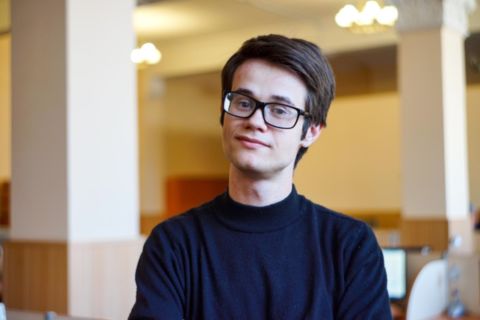A winner of the UMNIK competition, student of the SUSU Institute of Natural Sciences and Mathematics is working on a project to create a fundamentally new catalyst that will help to produce cheap biodiesel fuel from waste food raw materials. This type of fuel can be used for cars and other vehicles with diesel engine.
A third-year student of the Faculty of Chemistry Gleb Zirnik has presented a project for the processing of used food raw materials into fuel for the student work competition. The project is supervised by a researcher, senior lecturer of the Department of Materials Science, Physical and Chemical Properties of Materials Aleksandr Chernukha. The aim of the work is to create a cheap and regenerable catalyst, with the help of which it will be possible to convert food raw materials and waste edible fats into biofuels. The catalyst is a finely dispersed powder of brown, gray or red colour, depending on the composition, and is used to accelerate chemical reactions.
“We are planning to create a new catalyst using the transesterification reaction between alcohols and triglycerides of fatty acids. At present, such catalysts as alkali metals, their alcoholates and acids are used for this reaction. These catalysts can be used once, and their use requires further waste disposal. The ferrite catalyst does not have these disadvantages. It can be reused because it does not dissolve in water, and regenerated because it is magnetically active. The resulting biofuel, biodiesel, is an excellent analogue for synthetic diesel. When combusted, it gives less carbon monoxide and soot, is biodegradable, and its production helps to get rid of food waste,” says Gleb Zirnik.
This development will be of interest to biofuel companies. The use of waste raw materials will significantly reduce the cost of the finished product.
In addition to creating the catalyst itself, the team is also working on a new technology for its use. The production of ferrite catalysts has already started, and a series of laboratory experiments are to be carried out in order to understand how effective they are. The test results will be covered in a number of scientific articles in highly rated scientific journals, indexed in Scopus and Web of Science.
South Ural State University (SUSU) is a university of digital transformations, where innovative research is conducted in most of the priority fields of science and technology development. In accordance with the strategy of scientific and technological development of the Russian Federation, the university is focused on the development of big scientific interdisciplinary projects in the field of digital industry, materials science, and ecology. In the Year of Science and Technology, it will take part in the competition under the Priority-2030 program. The university acts as a regional project office of the World-class Ural Interregional Research and Education Centre (UIREC).




